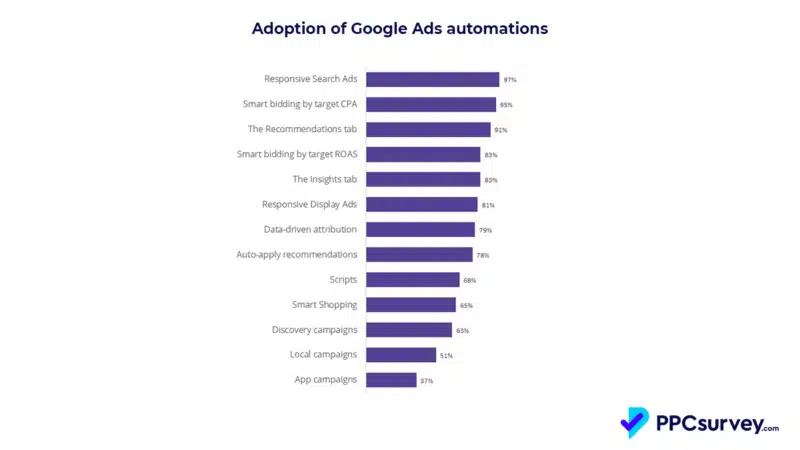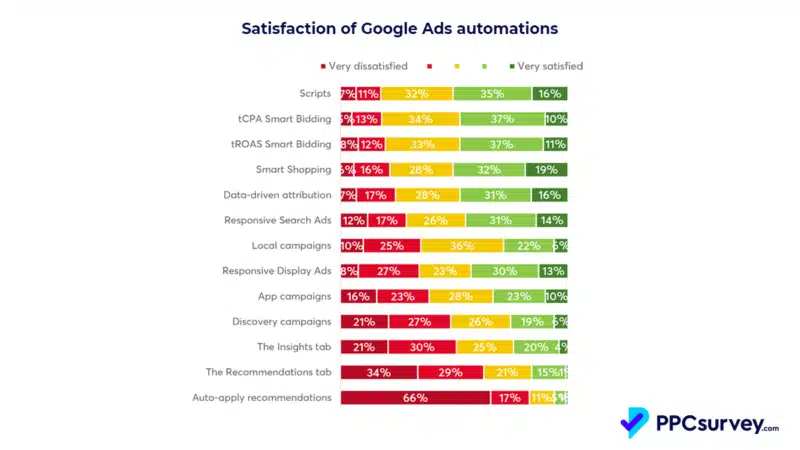PPC Survey: Adoption of Google Ads automation high, marketers unhappy with recommendations
A detailed new survey uncovers the most pressing issues of PPC experts as well as sentiment around the platforms and their features.
PPCsurvey.com has just released a new State of PPC Global Report for 2022. It includes input from more than 500 PPC specialists from around the globe.
The findings cover search marketers’ largest concerns, top priorities, spend data, automation insight and a wealth of information about the most pressing trends in paid search.
Here’s a breakdown of some of the largest findings.
High adoption rate of automations in Google Ads. Two eye-opening metrics in the survey:
- 97% of respondents use Responsive Search Ads.
- 95% have implemented Smart Bidding (tCPA).
Most surprisingly a whopping 78% of respondents have used Auto-applied Recommendations.

The time has passed when advertisers could compete without adopting automation.
Adoption of automation is high, but marketer satisfaction is mixed. The least satisfying automation, according to respondents, was Auto-applied Recommendations.
- 83% of respondents reported that they were dissatisfied with the Auto-applied Recommendations feature.
Another surprise came from one of Google’s biggest pushes as of late: The Recommendations Tab. The feelings on Recommendations were 63% negative, according to PPCsurvey.com.
Why so negative? Top complaints about the feature include “the ‘one-size-fits-all’ approach and the obvious push for smart bidding, broad match, and budget increases.”

Respondents were more satisfied with other automation.
- 51% of search marketers reported being satisfied with scripts.
- 48% said they were satisfied about tROAS Smart Bidding.
- 47% of respondents were satisfied about tCPA Smart Bidding.
The most pressing priorities for PPC Specialists. What are their clients’ top priorities? Some new concerns appeared this year.
- Priority #1: improve goal-setting beyond traditional metrics (e.g., conversions, revenue). This includes the consideration of margin, including new versus traditional customers and Lifetime Value (LTV), with 62% of respondents stating that these were a top priority.
- Priority #2: Tracking improvements including cookieless concerns, GA4 and server-side tagging came in second with 56%.

Unsatisfactory scores for Optiscore. Google now requires Google Partners to maintain a 70% Optiscore, PPCsurvey.com took a look at the satisfaction levels for the metric. Respondents could rate from 1-10 and the results were turned into a Net promoter score (NPS) to gauge how many participants would recommend.
Only 15% of respondents value a high Optiscore with 41% of respondents considering a high Optiscore a detractor in an account.

Using NPS methodology, this would give a high Optiscore an overall negative NPS of -26, which is a very undesirable score.
- You can download the full report (PDF) here. It includes more information including global yearly ad spends, ad platform adoption, time-consuming activities, the top challenges for agencies and much more.
Why we care. While the adoption of automation is considerable, the satisfaction is a mixed bag. Some standouts include Smart Bidding and scripts, but recommendations racked up high dissatisfaction numbers.
Additionally, practitioners aren’t fans of having a high Optiscore, with more considering it a detractor than a positive. If you rely on these scores and use these metrics as a barometer for account health, you are going against the collective thought of the PPC experts who participated in this survey.
Lastly, advertisers are looking for better performance tracking. Folks are looking outside simple conversions and to more meaningful performance data while also figuring out better tracking options as ad platforms and analytics platforms are changing.
Contributing authors are invited to create content for Search Engine Land and are chosen for their expertise and contribution to the search community. Our contributors work under the oversight of the editorial staff and contributions are checked for quality and relevance to our readers. The opinions they express are their own.
Related stories